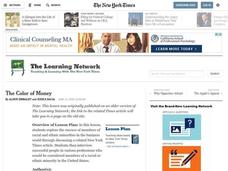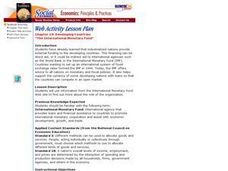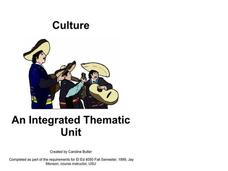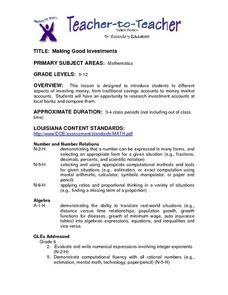Curated OER
Why Do People Save?
Students identify ways in which they can save and spend their money. They discover why people save money and calculate simple interest. They discuss the costs and benefits of saving.
Curated OER
The Color of Money
Young scholars explore the success of members of racial and ethnic minorities in the business world through discussing a related New York Times article. They interview successful people in various professions who would be considered...
Curated OER
Consumer Borrowing and Spending
Credit can be confusing for teens, some of whom are already using credit cards. Clear up misconceptions with this group research activity which has a solid outline with a lot of room to adjust to your needs and resources. Groups are...
Curated OER
Comparison of Economic Systems
Here is a worksheet in which learners identify and compare economic systems (market, command, mixed, etc.) with 18 fill-in-the-blank questions and a graphic organizer.
Federal Reserve Bank
The Little Red Hen Makes a Pizza
Make a study of producers and consumers with an updated version of the classic story The Little Red Hen (this one is called The Little Red Hen Makes a Pizza). After reading and discussing the story and terms, learners practice being...
Curated OER
Glossary Of Federal Reserve Terms
Students engage in a reading of a document in order to become familiar with the Federal Reserve of The United States in the interest of strengthening reading comprehension skills with the exposure to expository literature. They read the...
Curated OER
Acquiring Additional Capital Stock
Students become involved in the practice of learning about finance. The emphasis is on how one uses the stock market. One can also learn how to use personal finance and become acquainted with debt management.
Curated OER
Selling, Spending, or Saving
Students examine and discuss vocabulary dealing with finances. They write and develop commercials promoting savings practices and spending habits that incorporate emotional appeals.
Curated OER
Developing Countries - International Monetary Fund
Students access the International Monetary Fund website and explore it in order to research the role of the organization. They use their findings to describe the purpose and activities of the International Monetary Fund.
Curated OER
You Could Be a Banker
Pupils examine the careers that are available at financial institutions. They ask questions to visitors from these institutions who come to speak about their career. They also identify different job descriptions.
Curated OER
Learn to Earn When You Tend to Spend
Students examine spending and earning, and calculate change up to a dollar. They view and participate in demonstrations of earning and spending math problems, complete a worksheet, and play a game in pairs that simulates banking.
Curated OER
Defining Culture
Second graders define the term culture and are exposed to a variety of cultures from around the world. They read books, play Native American games, develop a class book that examines their own culture and, after examining currencies from...
Curated OER
Family Finances
Students examine the dynamics of family finances. In groups, they discuss the importance of a budget and create their own given a fictional amount of money. As a class, they listen to a speaker from the bank discussing the importance of...
Curated OER
ADULT ESOL LESSON PLAN--Level 2--Time and Money
Students, while daily reviewing an extensive vocabulary list of terms on the board, explore/identify what checking/saving accounts are used for as well as the process of writing a check.
Curated OER
Using An ATM
Learners engage in a lesson on how to use an ATM, or Automated Teller Machine. They see how to bank with an ATM and practice banking using several different types of transactions. This lesson includes a teaching worksheet to practice...
Curated OER
Calculating Interest
Students solve interest problems for bank accounts and loans to gain real life experience. They also review newspapers and find a car they wish to purchase then are given a rate and time of loan.
Curated OER
The Economy of the 1920s v. The Economy of the 1930s
In this U.S. economics of the 1920s and 1930s worksheet, students read a passage and then complete a graphic organizer comparing the credit, wages, employment, sales, stock market, and banks in the 2 decades.
Curated OER
Managing Your Finances
Students practice the skills involved in managing their finances. The steps in balancing a checkbook and matching expences to a bank statement are practiced and written in detail. This lesson is intended for students acquiring English.
Curated OER
Checkbook
High schoolers examine how to balance a checkbook. In this economics lesson, students demonstrate that they can balance a checkbook by completing an activity that includes a check register and bank statement.
Curated OER
FINANCE AND RESPONSIBLE LENDING.
Students study the role of banks, lending and their services. In this analysis lesson plan, students learn about savings, checking accounts and lending and the importance of banks as financial intermediaries.
Curated OER
Introduction to Earning Interest: What are APR and APY?
Students explore saving and investing money. In this middle school personal finance lesson plan, students define and use investment vocabulary, explore compound interest and its effect of savings, and compute simple and compound...
Curated OER
Making Good Investments
Students compare different aspects of investing money from traditional savings accounts to money market accounts. They research investment accounts at local banks and compare them.
Curated OER
Current Currencies
Students explore the nature of money. They view how monetary systems evolved. They examine how different cultures value money and how foreign exchange rates work. Charting currency exchange rates begin.
Curated OER
Return On Investment
Students engage in a lesson introducing them to the concept of return on investment, or ROI. Return on investment is a basic principle that should be understood before investing money.
Other popular searches
- Money and Banking
- Economics Money and Banking
- Economics Money and Banking
- Money Banking
- Law Money Banking























